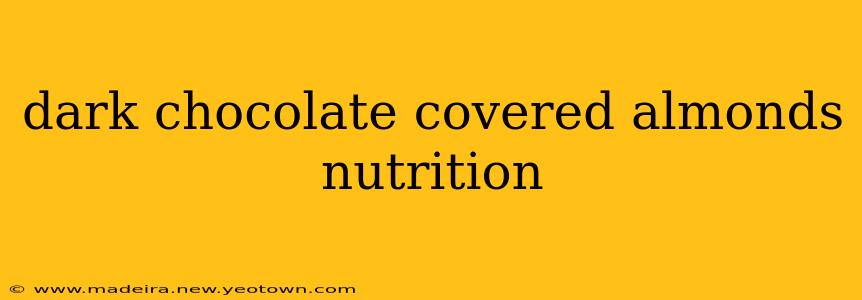Let's be honest, the combination of rich dark chocolate and crunchy almonds is irresistible. But beyond the delightful taste, what's the nutritional profile of these delectable treats? Are they a healthy snack, or just another indulgence? We'll delve into the specifics, exploring the nutritional benefits and potential drawbacks to help you make informed choices.
What are the nutritional benefits of dark chocolate covered almonds?
Dark chocolate covered almonds offer a unique blend of nutrients from both the chocolate and the almonds. The almonds provide healthy fats, fiber, protein, and a good dose of vitamin E, magnesium, and other essential minerals. Dark chocolate, particularly if it has a high cacao percentage (70% or higher), is a source of antioxidants called flavonoids, which are linked to various health benefits, including improved heart health and reduced inflammation. Together, they create a snack that's potentially more beneficial than either ingredient alone. However, moderation is key, as we'll see.
How many calories are in dark chocolate covered almonds?
The calorie count of dark chocolate covered almonds varies significantly depending on the size of the almonds, the amount of chocolate coating, and the specific brand. Generally, a small serving (about 1 ounce or 28 grams) can contain anywhere from 150 to 200 calories. These calories come from a mix of healthy fats, carbohydrates, and protein, but overconsumption can still contribute to weight gain. Always check the nutrition label on your specific product for the most accurate information.
Are dark chocolate covered almonds good for weight loss?
This is a tricky question. While dark chocolate covered almonds offer some nutritional value, they are still relatively calorie-dense. They're not inherently "bad" for weight loss, but they shouldn't be considered a weight-loss tool. If you're aiming to lose weight, incorporating them into your diet requires mindful portion control. A small handful as an occasional treat is unlikely to derail your progress, but regularly consuming large quantities could hinder your weight loss goals.
What are the potential drawbacks of eating dark chocolate covered almonds?
Despite their nutritional benefits, several potential drawbacks exist. Firstly, as mentioned, they are calorie-dense. Secondly, the sugar content can be high, particularly in dark chocolate with lower cacao percentages. Thirdly, some individuals might be allergic to almonds or have sensitivities to certain components of chocolate. Finally, the high fat content, while largely healthy fats, can contribute to weight gain if consumed excessively. It's crucial to consume them in moderation.
Are dark chocolate covered almonds good for diabetics?
For individuals with diabetes, the high sugar and carbohydrate content of dark chocolate covered almonds requires careful consideration. While dark chocolate itself offers some potential benefits, the overall impact on blood sugar levels depends on the serving size and the individual's specific metabolic needs. Consulting a doctor or registered dietitian is crucial before incorporating dark chocolate covered almonds into a diabetic diet. They can help determine appropriate portion sizes and monitor the impact on blood glucose levels. Focus on dark chocolate with high cacao content and small portions.
Conclusion: Enjoy in Moderation
Dark chocolate covered almonds offer a delicious blend of flavor and some nutritional benefits. However, they're not a miracle food. Mindful consumption, paying close attention to portion sizes, and considering individual dietary needs and health conditions are crucial for enjoying these treats responsibly. Remember to always check the nutrition label for specific details and consult a healthcare professional if you have any concerns.

